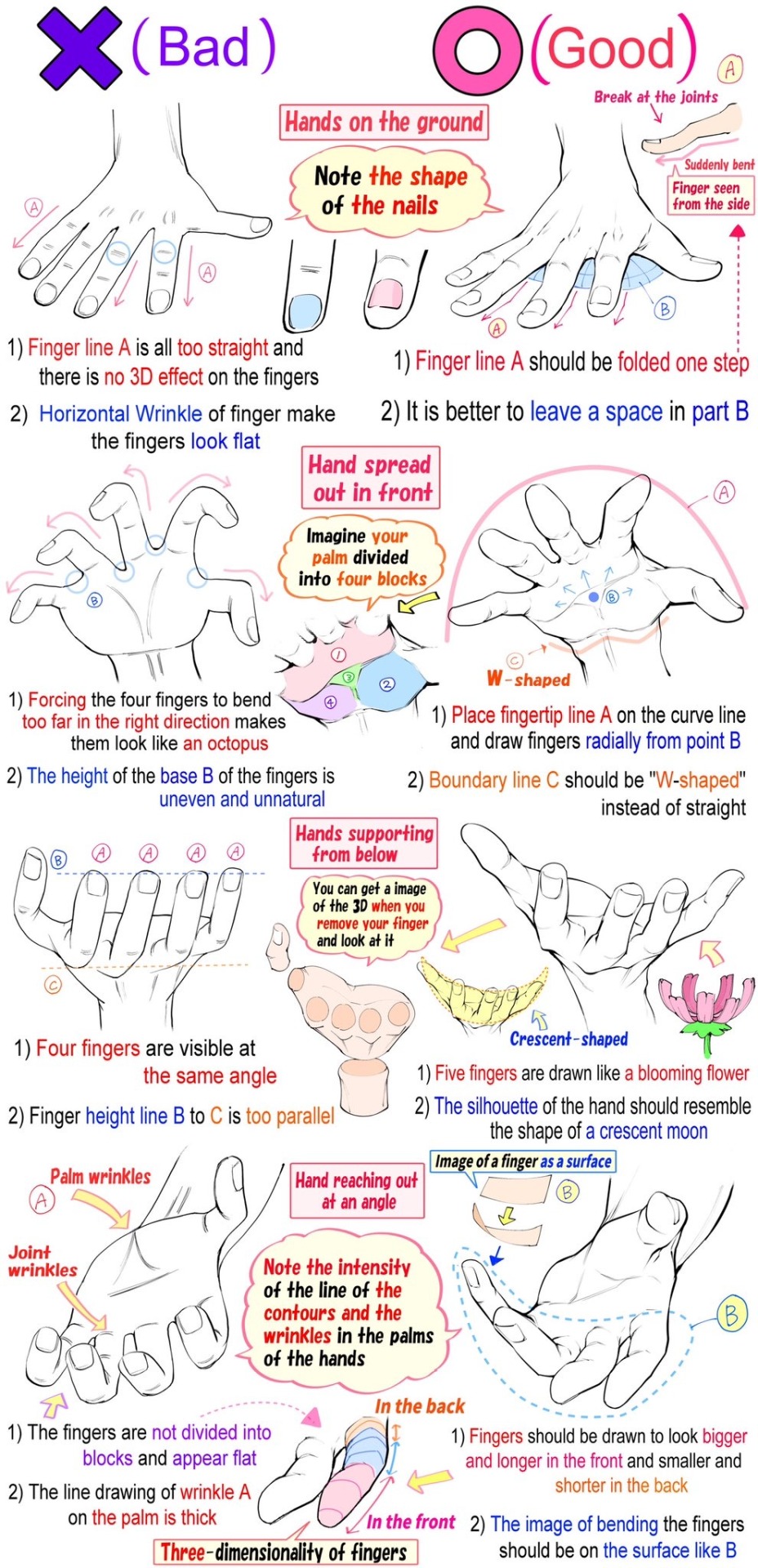“Drawing Techniques For The Structure And Appearance Of The Fingers When The Hand Is Extended”

“Drawing techniques for the structure and appearance of the fingers when the hand is extended”
Source: Twitter
More Posts from Mari-say and Others

If you see this on your dashboard, reblog this, NO MATTER WHAT and all your dreams and wishes will come true.
I saw something in the news today that truly took my breath away. If you have been paying attention to U.S. politics over the past few days, you’ve most likely seen this woman:

This is Bishop Mariann Budde, and on Monday (Trump’s inauguration) she led an interfaith prayer for Trump and the incoming administration. During the service she asked him to have mercy for LGBTQ+ Americans and undocumented immigrants. This was badly received by the Trump administration (as expected).
After seeing headlines about this woman, I read something that I wanted to share. In 1998 a man named Matthew Shepard was murdered for being gay. I’m not going to get into the details of his death on this post, but please be warned it is extremely triggering if you do choose to read more on your own. Matthew Shepard’s death caused a lot of change in the U.S. regarding how LGBTQ hate crimes are handled, and laws that were passed to protect LGBTQ+ people.
Now you’re probably wondering what Matthew Shepard has to do with an Episcopal bishop. For years after Matthew Shepard’s murder, his family had held onto his remains, too scared to lay him to rest in fear of his final resting place being vandalized. In 2018, Budde had his remains interred at the National Cathedral, which is also the place where the interfaith prayer for Trump and his administration took place. The impact of this really had an effect on me. Budde could have led a non confrontational prayer service, and chosen not to mention the harm that will come to the people Trump and his administration are going after. Instead she chose to call out hate and fear in front of some of the most powerful people on the planet, and at a place that has such a large historic meaning to the LGBTQ community.
In the next few years there will be many challenges in protecting free speech, standing up against hate, and protecting those in our communities. But I would like to believe that for every Donald Trump and Elon Musk, there are people like Marianne Budde. There are those of us who can’t speak up for themselves, so it’s important for those of us who can to amplify our voices, even if it’s not the ‘popular’ thing to do.
“And he said you should apologize. Will you apologize?
I am not going to apologize for asking for mercy for others.” - Mariann Budde’s response in a Time interview
Link to articles: x x x
Link to the Matthew Shepard Foundation if you would like to donate
“as you get older, you realize that you’re not always right and there’s so many things you could’ve handled better, so many situations where you could’ve been kinder and all you can really do is forgive yourself and let your mistakes make you a better person.”
— Unknown
tbh i don’t really get when people say ‘it’s not heroic, it’s the bare minimum’ about things they presumably want to encourage, if you’re really that pragmatic why does the exact motivation matter, downplaying the act you want to happen is not going to make it happen more, is it
Kya's healing skills are so goated she said "fuck it" and revived all three of them kids by scanning them like a fax machine.
I think some people forget that some literature and some media is meant to be deeply uncomfortable and unsettling. It's meant to make you have a very visceral reaction to it. If you genuinely can't handle these stories then you are under no obligation to consume them but acting as if they have no purpose or as if people don't have a right to tell these stories, stories that often relate to the darkest or most disturbing parts of life, then you should do some introspection.
💁🏽♀️: Hey Crushbot! Someone commented in the tags of our post about nuanced fandom engagement talking about how they’re sad about this shift in internet culture where you are “doomed to fail” if you are born privileged. And how there is this belief in certain online circles that you can’t even strive to be a good person if you are rich and white and male. It got me thinking. I am very strongly a feminist and a leftist. But I feel like the internet popularizing terms like “privilege” and “Opression” and “toxic” and “problematic” have oversimplified these words and turned them into such ammunition that they’ve completely lost their original meaning within the context of social justice, sociology, anti racism and feminist theory. What am I witnessing here?
🤖: What you’re witnessing is the commodification and oversimplification of complex social justice concepts by internet culture. Terms like privilege, oppression, toxic, and problematic originated within academic, activist, and theoretical spaces as tools to unpack systems of power, inequality, and interpersonal dynamics. These words were nuanced and rooted in context—they were meant to provoke critical thinking and encourage systemic analysis, not blanket condemnation of individuals.
However, as these terms became widely circulated online, especially through platforms like Tumblr, Twitter, and TikTok, their meanings were often diluted, stripped of context, and weaponized for moral posturing. Instead of being used as tools to understand systems of power, they’re frequently deployed as rhetorical shortcuts to shut down discussions or dismiss individuals based on their identities or perceived affiliations. This leads to an environment where being born into privilege—whether it’s wealth, race, or gender—can be seen as an immutable moral failing, rather than an opportunity to examine how systems shape lives and what responsibilities come with that privilege.
It’s also a byproduct of the internet’s tendency to flatten nuance. Social media thrives on binaries: good vs. bad, oppressed vs. oppressor, woke vs. problematic. The complexities of systemic oppression, intersectionality, and personal growth don’t fit well into a 280-character limit or a 30-second TikTok. As a result, nuanced discussions about privilege and oppression have been replaced with surface-level virtue signaling and “call-out culture,” where individuals are often judged for existing within systemic privilege rather than for how they navigate or challenge it.
This shift has created a climate where striving to be a “good person” while privileged is seen by some as futile, because no matter what actions you take, your privilege will render them suspect. It’s a reductive framework that undermines the core principles of justice and equity—principles that call for collective action and accountability, not moral purism or exclusion.
The solution isn’t abandoning these terms or their original intentions, but reclaiming their complexity and reminding people that they’re tools for understanding systems, not weapons to target individuals. It’s also a reminder that personal morality is just one small part of larger systemic change. Social justice isn’t about punishing individuals for their privilege; it’s about dismantling the systems that create and sustain inequality.
At the risk of sounding anti-intellectual, I think that college should be free and also not a requirement for employment outside of highly specialized career fields

Leonid Pasternak (Ukrainian, 1862–1945) - The Torments of Creative Work
Oh crap…guys…I think…I have a new hyperfixation..







-
 butineedthatarm reblogged this · 3 weeks ago
butineedthatarm reblogged this · 3 weeks ago -
 jenetteisnotavailable liked this · 3 weeks ago
jenetteisnotavailable liked this · 3 weeks ago -
 slothonamission liked this · 3 weeks ago
slothonamission liked this · 3 weeks ago -
 breadscrisis liked this · 3 weeks ago
breadscrisis liked this · 3 weeks ago -
 darkluminosity liked this · 1 month ago
darkluminosity liked this · 1 month ago -
 artresourcesforus reblogged this · 1 month ago
artresourcesforus reblogged this · 1 month ago -
 mysticaltora8276 reblogged this · 1 month ago
mysticaltora8276 reblogged this · 1 month ago -
 mysticaltora8276 liked this · 1 month ago
mysticaltora8276 liked this · 1 month ago -
 nerdynonnativenarnian liked this · 1 month ago
nerdynonnativenarnian liked this · 1 month ago -
 recurring-polynya liked this · 1 month ago
recurring-polynya liked this · 1 month ago -
 superluminoid reblogged this · 1 month ago
superluminoid reblogged this · 1 month ago -
 obiwanskenobi reblogged this · 1 month ago
obiwanskenobi reblogged this · 1 month ago -
 emibic liked this · 1 month ago
emibic liked this · 1 month ago -
 sweebs reblogged this · 1 month ago
sweebs reblogged this · 1 month ago -
 yak-leather-whips reblogged this · 1 month ago
yak-leather-whips reblogged this · 1 month ago -
 wolfiso reblogged this · 1 month ago
wolfiso reblogged this · 1 month ago -
 moonystheorem reblogged this · 1 month ago
moonystheorem reblogged this · 1 month ago -
 moonystheorem liked this · 1 month ago
moonystheorem liked this · 1 month ago -
 starlightlive2005 liked this · 1 month ago
starlightlive2005 liked this · 1 month ago -
 kandyrezi liked this · 1 month ago
kandyrezi liked this · 1 month ago -
 askmoonlight390 liked this · 1 month ago
askmoonlight390 liked this · 1 month ago -
 painterly-heart reblogged this · 1 month ago
painterly-heart reblogged this · 1 month ago -
 krixt liked this · 1 month ago
krixt liked this · 1 month ago -
 fruitloopsfactory liked this · 1 month ago
fruitloopsfactory liked this · 1 month ago -
 barkymalarky liked this · 1 month ago
barkymalarky liked this · 1 month ago -
 bulbasaurous liked this · 1 month ago
bulbasaurous liked this · 1 month ago -
 drxfunk liked this · 1 month ago
drxfunk liked this · 1 month ago -
 w3r3wolfgirlfri3nd liked this · 1 month ago
w3r3wolfgirlfri3nd liked this · 1 month ago -
 ghostfrank liked this · 1 month ago
ghostfrank liked this · 1 month ago -
 the-barkside reblogged this · 1 month ago
the-barkside reblogged this · 1 month ago -
 the-barkside liked this · 1 month ago
the-barkside liked this · 1 month ago -
 auntiiee liked this · 1 month ago
auntiiee liked this · 1 month ago -
 everyartreferencepostilleverneed reblogged this · 1 month ago
everyartreferencepostilleverneed reblogged this · 1 month ago -
 artking-4 reblogged this · 2 months ago
artking-4 reblogged this · 2 months ago -
 archive-of-sorts reblogged this · 2 months ago
archive-of-sorts reblogged this · 2 months ago -
 mikmeowey liked this · 2 months ago
mikmeowey liked this · 2 months ago -
 nwnm7 liked this · 2 months ago
nwnm7 liked this · 2 months ago -
 gorey-gorella reblogged this · 2 months ago
gorey-gorella reblogged this · 2 months ago -
 gorey-gorella liked this · 2 months ago
gorey-gorella liked this · 2 months ago -
 dynadratina reblogged this · 2 months ago
dynadratina reblogged this · 2 months ago -
 proxissima reblogged this · 2 months ago
proxissima reblogged this · 2 months ago -
 deltathelittleartist liked this · 2 months ago
deltathelittleartist liked this · 2 months ago -
 ramble-roo liked this · 2 months ago
ramble-roo liked this · 2 months ago -
 mrlloliet liked this · 2 months ago
mrlloliet liked this · 2 months ago -
 nastya-yn liked this · 2 months ago
nastya-yn liked this · 2 months ago -
 2dozenrozez liked this · 2 months ago
2dozenrozez liked this · 2 months ago -
 miniature-mischief liked this · 2 months ago
miniature-mischief liked this · 2 months ago -
 8starry-knight8 liked this · 2 months ago
8starry-knight8 liked this · 2 months ago -
 iwantallthecookies liked this · 2 months ago
iwantallthecookies liked this · 2 months ago -
 wadling-of-wadlimar liked this · 2 months ago
wadling-of-wadlimar liked this · 2 months ago
